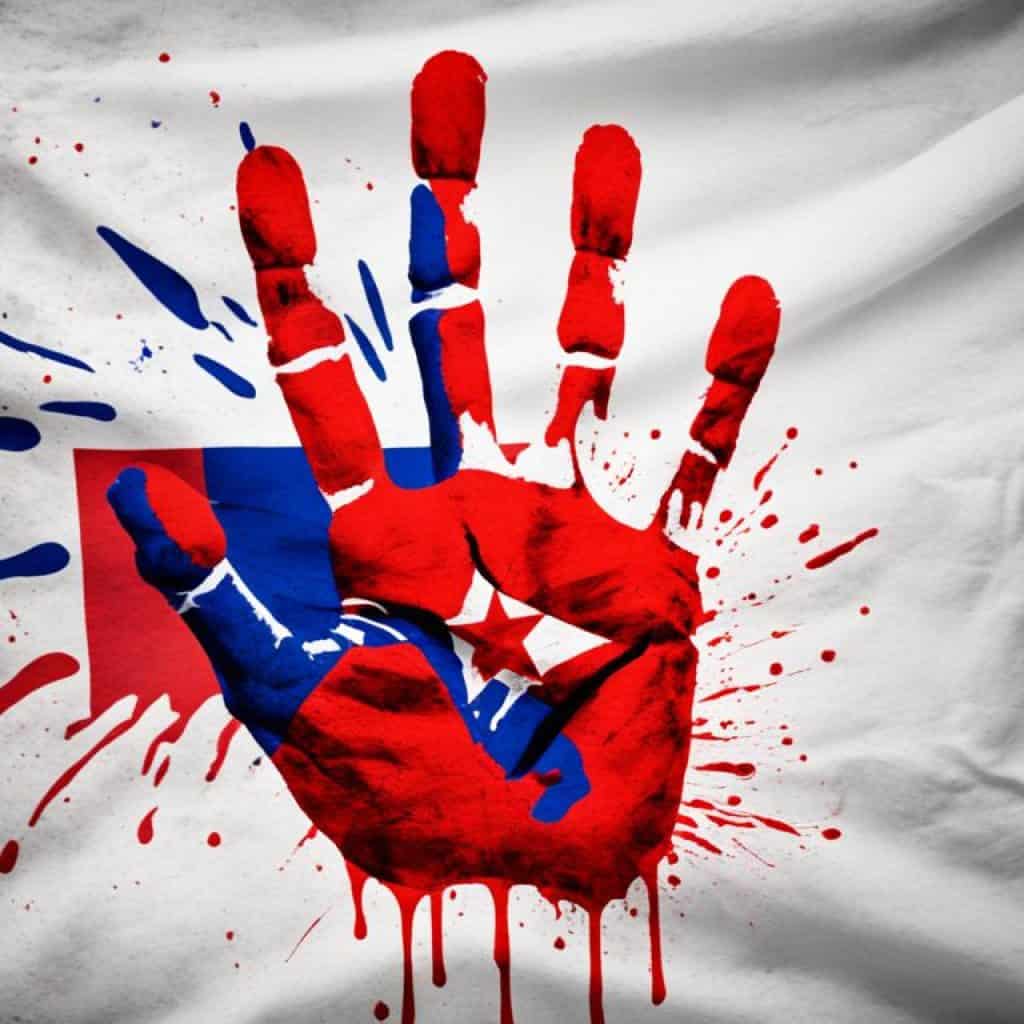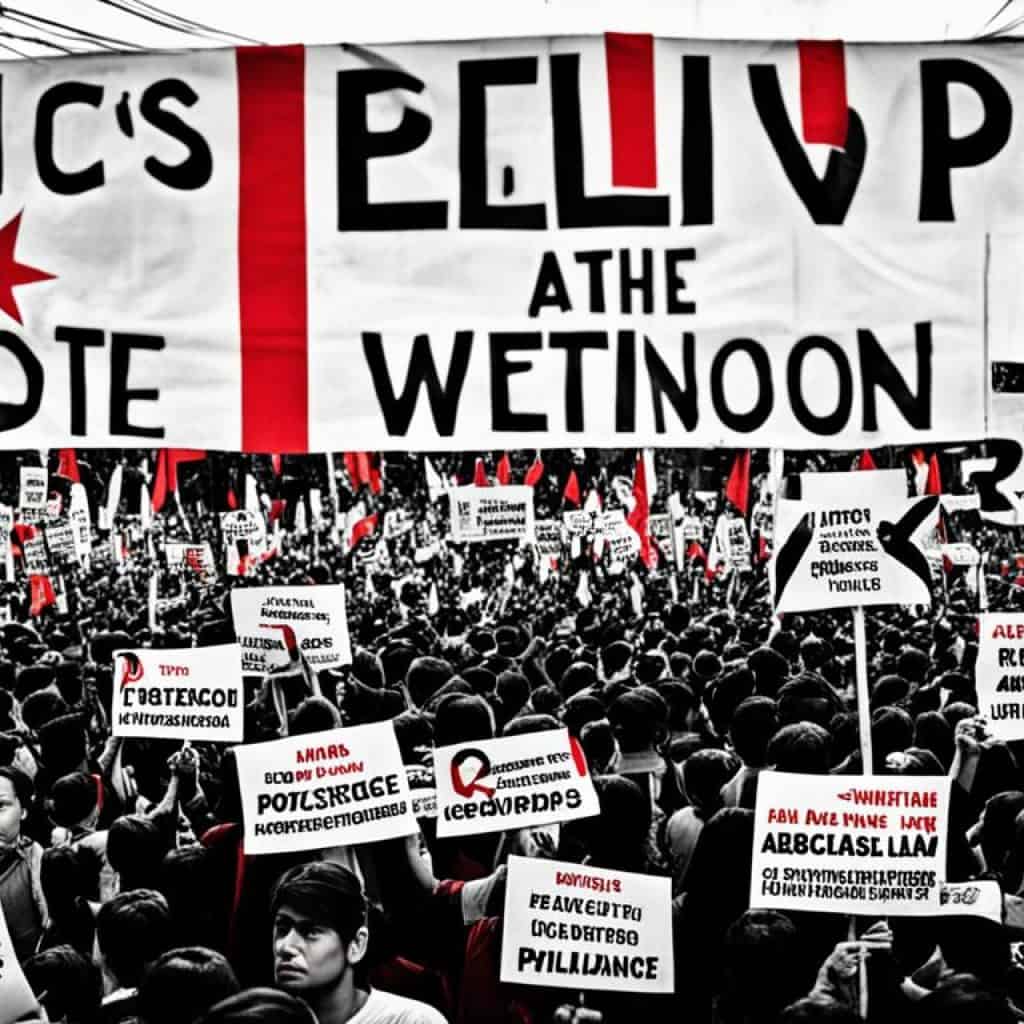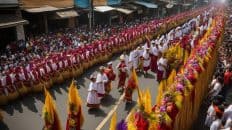Have you ever wondered why some individuals or organizations in the Philippines are labeled as communists or terrorists, regardless of their actual beliefs or affiliations? What is the true definition of red tagging and how does it impact the country?
Red Tagging is a practice that has plagued the Philippines for years, where those critical of the government are unjustly branded as enemies of the state. This labeling leads to harassment, threats, and even human rights violations. But why does it happen and what are the consequences? Let’s delve deeper into the world of red tagging and uncover its hidden truths.
Key Takeaways:
- Red Tagging in the Philippines involves labeling individuals or organizations critical of the government as communists or terrorists.
- Red Tagging leads to harassment, threats, and human rights violations.
- Indigenous leaders and activists are particularly vulnerable to red tagging.
- The justice system is often used to harass red-tagged individuals through politically motivated charges.
- Red Tagging in the Philippines has been internationally condemned, yet government support persists.
Impact on Indigenous Leaders and Activists
Indigenous leaders and activists in the Philippines face significant challenges and dangers as a result of red-tagging. Often falsely accused of being fighters or supporters of the communist insurgency, they become targets for government security forces. This practice not only puts their lives at risk but also contributes to making the Philippines one of the most dangerous countries in Asia for environmental activists and land defenders.
The impact of red-tagging on indigenous leaders and activists goes beyond physical threats. It extends to their ability to peacefully express their views and protect their land and cultural heritage. Red-tagging hampers their advocacy efforts and stifles their voices, preventing them from fighting for their rights and the preservation of their ancestral domains.
Indigenous leaders and activists experience harassment, threats, and attacks, both online and offline, due to their red-tagged status. The labeling of these individuals as communist sympathizers not only endangers their lives but also creates a hostile environment where they face constant surveillance and restrictions. Their safety, freedom of speech, and right to defend their communities are severely compromised by the impact of red-tagging.
“Red-tagging perpetuates a climate of fear and intimidation, limiting the agency of indigenous leaders and activists in their pursuit of justice and protection of their ancestral lands.” – Indigenous Rights Advocacy Group
Threats to Human Rights and Environmental Conservation
The targeting of indigenous leaders and activists through red-tagging has profound implications for human rights and environmental conservation efforts in the Philippines. By silencing these voices, the government undermines the work of environmental defenders, hindering their ability to protect natural resources and combat destructive practices such as illegal logging and mining.
| Impact of Red-Tagging on Indigenous Leaders and Activists | Consequences |
|---|---|
| Inhibition of free expression | Indigenous leaders and activists are discouraged from freely expressing their opinions and advocating for their communities’ rights and welfare. |
| Restrictions on advocacy | Red-tagging limits the ability of indigenous leaders and activists to effectively advocate for the preservation of their land and cultural heritage. |
| Fear and intimidation | Red-tagging creates a climate of fear, subjecting indigenous leaders and activists to harassment, threats, and attacks. |
| Increased vulnerability | Indigenous leaders and activists become targets for security forces, putting their lives and personal safety at risk. |
| Compromised environmental conservation | The suppression of indigenous voices through red-tagging undermines efforts to protect natural resources and combat destructive practices. |
It is essential to recognize the invaluable role that indigenous leaders and activists play in preserving the environment and advocating for the rights of their communities. Ensuring their safety and empowering them to freely voice their concerns is crucial for sustainable development and the protection of human rights in the Philippines.
Harassment through the Justice System
Red-tagged individuals in the Philippines often face harassment through the justice system. They are subjected to politically motivated charges, such as defamation and other fabricated offenses. This tactic is used by the government to silence dissent and curtail freedom of expression. The controversy surrounding red-tagging has raised concerns about its legality and its impact on human rights in the country.
The misuse of the justice system to target individuals critical of the government has significant implications for democracy and the rule of law. It undermines trust in the judicial process and threatens the fundamental rights of citizens. Red-tagging controversy has sparked debates about the need for legal reforms to prevent the abuse of power and protect the rights of individuals from politically motivated charges.
Red-tagging is not only a violation of human rights but also a threat to the principles of justice and fairness. It undermines the integrity of the justice system and erodes trust in its ability to deliver unbiased judgments. The government should be held accountable for its actions and ensure that individuals are not targeted based on their political beliefs.
The controversy surrounding red-tagging has prompted discussions about the need for a comprehensive red tagging law in the Philippines. Such a law, if properly crafted, could provide clear guidelines on the definition of red-tagging, establish safeguards to protect individuals from harassment and false charges, and impose penalties on those who misuse red-tagging as a tool for political repression.
| Effects of Harassment through the Justice System: | Related Keywords: |
|---|---|
| 1. Silencing dissent and curbing freedom of expression | – Red tagging law |
| 2. Undermining faith in the justice system | – Red tagging controversy |
| 3. Threatening human rights and democracy | |
| 4. Targeted harassment based on political beliefs |
Targeting of Indigenous Leaders and Activists
Indigenous leaders and activists in the Philippines play a crucial role in advocating for the rights of their communities and protecting their ancestral lands. However, they have become prime targets of the alarming practice of red-tagging. Red-tagging, falsely accusing individuals and organizations of being communist or terrorist sympathizers, has had devastating consequences for indigenous leaders and activists.
Red-tagging has subjected indigenous leaders and activists to harassment, threats, and violence. They are often falsely labeled as recruiters for communist rebel groups, putting their lives and work at risk. This targeting has a significant impact on their ability to effectively advocate for indigenous rights and safeguard their communities.
The following table highlights the impact of red-tagging on indigenous leaders and activists:
| Effects of Red-Tagging on Indigenous Leaders and Activists |
|---|
| Harassment, threats, and violence |
| Labeling as communist or terrorist sympathizers |
| Risk to personal safety and well-being |
| Hindered advocacy for indigenous rights |
| Impeded protection of ancestral lands |
This targeting not only undermines the important work of indigenous leaders and activists but also poses a threat to the cultural heritage and well-being of indigenous communities. It restricts their ability to participate in decision-making processes that directly affect their lives and land.

It is crucial to recognize and address the adverse impact of red-tagging on indigenous leaders and activists, as their contributions are essential for the preservation of indigenous rights and the sustainable development of their communities.
Collaboration with Companies and Security Forces
Companies involved in infrastructure projects in the Philippines often collaborate with the police and military to secure control over project areas. While collaboration between different stakeholders can be beneficial, it can also lead to tensions and potential for violence.
Rival indigenous groups are sometimes organized to counter indigenous communities that criticize these projects. These rival groups claim to represent the entire community in support of the project, despite opposition from dissenting indigenous communities.
Red-tagging is used as a means to exclude dissenting indigenous communities from the requirement of “free, prior, and informed consent.” This legal principle is essential for protecting indigenous rights and ensuring their active participation in decision-making processes.
Collaboration, Red Tagging, and Indigenous Communities
This collaboration between companies, security forces, and rival indigenous groups exacerbates the impact of red-tagging on indigenous communities. Red-tagging not only targets individuals but also undermines the collective rights and aspirations of indigenous communities.
“The collaboration of companies, security forces, and rival groups creates a challenging environment for indigenous communities. It hampers their ability to protect their ancestral lands, preserve their cultural heritage, and advocate for their rights.” – Indigenous Rights Activist
Red-tagging serves to delegitimize the concerns and voices of dissenting indigenous communities, effectively silencing their opposition and concerns. It further marginalizes and undermines the recognition of their rights and aspirations.
The impact of red-tagging on indigenous communities is profound, with far-reaching consequences for their self-determination, security, and well-being.
Impact of Collaboration and Red-Tagging on Indigenous Communities
| Impact | Implications |
|---|---|
| Exclusion from decision-making processes | Dissenting indigenous communities are marginalized and silenced, denied the opportunity to participate in decisions that directly affect their ancestral lands and cultural heritage. |
| Violence and intimidation | Indigenous communities and individuals may face harassment, threats, and even physical violence as a result of their opposition to projects and red-tagging labeling them as communist sympathizers. |
| Erosion of indigenous rights | Red-tagging undermines the recognition and protection of indigenous rights, impeding their efforts to assert their collective aspirations and secure their ancestral lands. |
Collaboration between companies, security forces, and rival groups not only perpetuates red-tagging but also exacerbates the impact on indigenous communities, hindering their ability to protect their rights, lands, and cultural heritage.
International Condemnation and Government Support
Red-tagging in the Philippines has faced strong condemnation from international organizations like the United Nations Human Rights Council and the European Union. These bodies have expressed their concerns about the negative impact of red-tagging on human rights and its stifling effect on free expression. Despite these condemnations, the Philippine authorities continue to support and defend red-tagging practices.
“Red-tagging is a flagrant violation of human rights and undermines the democratic values we hold dear,” says UN spokesperson John Anderson. “It perpetuates a climate of fear and silences those who dare to dissent.”
This controversy surrounding red-tagging has raised alarm bells within the international community. The government, however, argues that red-tagging is a necessary component of democracy, claiming that it helps protect the nation from communist insurgents. This defense from the Philippine authorities has sparked further debate and resistance from numerous human rights advocates and organizations.

The Need for International Solidarity
As the controversy over red-tagging continues, it is imperative for the international community to stand in solidarity with the Philippines and advocate for the protection of human rights and freedom of expression. It is crucial to amplify the voices of those affected by red-tagging and support local organizations working to address this issue.
Political Pressure for Change
International organizations, governments, and individuals can exert political pressure on the Philippine authorities to reconsider their support for red-tagging. Diplomatic channels, public statements, and targeted advocacy campaigns can help raise awareness about the human rights violations associated with red-tagging and push for meaningful change.
Supporting Local Initiatives
Supporting and funding local organizations and initiatives that provide legal assistance, advocacy, and protection to individuals affected by red-tagging is crucial. By standing together with these organizations, the international community can help amplify the voices of those who have been silenced and contribute to progress towards justice and accountability.
| Steps to Address Red-Tagging | Benefits |
|---|---|
| International condemnation | Raises awareness and puts pressure on the Philippine authorities |
| Political pressure | Encourages government reconsideration and policy changes |
| Supporting local initiatives | Provides resources and assistance to affected individuals and organizations |
| Advocacy and awareness campaigns | Helps educate the international community about the issue and garner support |
Red-Tagging by Security Forces and Government Agencies
Security forces in the Philippines, including the Philippine National Police and the Armed Forces of the Philippines, have been implicated in red-tagging practices. They utilize social media posts and public meetings to target individuals and organizations, accusing them of being communist or terrorist sympathizers. This strategy often involves the use of tarps, streamers, and other visual tagging methods to publicly shame and intimidate the targeted individuals.
The involvement of government agencies such as the National Intelligence Coordinating Agency and the National Task Force on Ending Local Communist Armed Conflict further perpetuates red-tagging. These agencies contribute to the creation and dissemination of anti-communist propaganda, exacerbating the impact of red-tagging on targeted individuals and organizations.
Impact on Human Rights Violations
- Red-tagging by the security forces and government agencies leads to severe human rights violations, including harassment, threats, and violence against the targeted individuals.
- Freedom of expression and peaceful assembly are curtailed, as individuals are afraid to express dissenting views or participate in peaceful protests due to fear of being red-tagged.
- The practice undermines the principles of democracy and the protection of human rights.
Red-Tagging Law and Controversy
The legality of red-tagging and its alignment with human rights and international standards has been a subject of controversy in the Philippines.
The use of red-tagging as a practice raises concerns about the abuse of power and the violation of individuals’ rights to due process, freedom of expression, and privacy.
There is a need for greater clarity and safeguards within existing laws to prevent the misuse of red-tagging and protect the rights of individuals targeted by such practices.
| Implications of Red-Tagging by Security Forces and Government Agencies |
|---|
| 1. Chilling effect on free expression and dissent |
| 2. Harassment, threats, and violence against targeted individuals |
| 3. Erosion of democratic principles and human rights |
| 4. Protection of human rights and freedom of expression |
Red-tagging by security forces and government agencies represents a significant challenge to human rights and democracy in the Philippines. The practice results in the violation of individuals’ rights, stifles free expression, and perpetuates a climate of fear and intimidation. It is imperative that measures are taken to address and rectify these issues, ensuring the protection of fundamental rights and freedoms.
Exclusion of Indigenous Communities from Decision-Making
Red-tagging in the Philippines not only targets individuals and organizations but also has significant consequences for Indigenous communities. One of the troubling impacts of red-tagging is the exclusion of these communities from the decision-making process, particularly when it comes to major projects such as mining operations and hydropower dams. When Indigenous communities express opposition to these projects due to concerns about their ancestral lands and cultural heritage, they are often labeled as communist sympathizers or terrorists through red-tagging.
This malicious labeling effectively stifles their ability to engage with affected communities and advocate for their rights. As a result, Indigenous communities are denied the opportunity to participate in decisions that directly impact their lives and territories. Red-tagging undermines their fundamental right to have a voice in the development processes that affect their ancestral lands and natural resources.
“Red-tagging denies Indigenous communities their right to participate in decisions that affect their ancestral lands and cultural heritage.”
Companies involved in these projects must recognize their responsibility to operate in a manner that respects the rights and well-being of Indigenous communities. They should prioritize meaningful consultation and consent, in line with international standards such as the United Nations Declaration on the Rights of Indigenous Peoples. By doing so, companies can mitigate the harm caused by their activities and ensure that Indigenous communities are not left out of the decision-making process.
It is crucial to challenge red-tagging and its exclusionary impact on Indigenous communities. Protecting the rights of Indigenous peoples and facilitating their active participation in decision-making processes is essential for fostering a just and inclusive society in the Philippines.
Political System and Historical Context
The use of red-tagging in the Philippines is deeply rooted in the country’s political system and historical context. The Philippines has a tumultuous history, including periods of authoritarian rule, such as the martial law declared by Ferdinand Marcos Sr. in 1972. During these times, red-tagging emerged as a tactic used by the government to suppress dissent and maintain control over the population.
Red-tagging is a key feature of the political regime in the Philippines, characterized as a competitive authoritarian regime, where freedom of expression and peaceful assembly are constantly under threat. The practice of red-tagging undermines the democratic principles that form the foundation of any functioning society.
The Martial Law Era
One significant period in Philippine history that shaped the use of red-tagging is the martial law era under Ferdinand Marcos Sr. From 1972 to 1981, the country faced a strict authoritarian regime characterized by widespread human rights violations and a crackdown on political dissent. During this time, red-tagging was employed as a tool to silence opposition and maintain control over the population.
Red-tagging served as a mechanism to label individuals or groups critical of the government as communist or terrorist supporters, undermining their credibility and intimidating others from engaging in dissent.
This historical context created an environment where red-tagging became deeply ingrained in institutions and political practices, perpetuating a cycle of suppression and fear.
A Legacy of Suppression
Red-tagging has continued to be used by subsequent administrations in the Philippines, perpetuating a legacy of suppression and control. Critics argue that the practice is a way for those in power to marginalize and discredit individuals or organizations that challenge their authority.
By labeling dissenters as communist or terrorist sympathizers, authorities aim to delegitimize their criticism and incite fear in those who might consider speaking out.
This systematic use of red-tagging within the political system further undermines the democratic ideals that the Philippines aspires to uphold.
The Chilling Effect
The historical context surrounding red-tagging in the Philippines has created a chilling effect on free expression and the right to dissent. Individuals or groups that are red-tagged face harassment, threats, and violence, both online and offline.
- Online harassment: Red-tagged individuals often become targets of online harassment campaigns, where they are subjected to malicious comments, doxxing, and even threats on social media platforms.
- Offline threats and violence: The practice of red-tagging extends beyond online spaces, with red-tagged individuals facing real-world threats and violence, including physical assault and even extrajudicial killings.
This climate of fear and intimidation severely restricts the ability of individuals to express their opinions freely, stifling critical discourse and perpetuating a culture of silence.
| Impact of Political System and Historical Context on Red-Tagging | Effects |
|---|---|
| The political system characterized as a competitive authoritarian regime | A constant threat to freedom of expression and peaceful assembly |
| The martial law era under Ferdinand Marcos Sr. | Established a precedent for the use of red-tagging as a tool of suppression and control |
| Legacy of red-tagging | Continued use by subsequent administrations perpetuates a culture of suppression |
| Chilling effect on free expression | Harassment, threats, and violence limit individuals’ ability to voice their opinions |
Anti-Terrorism Act and Red-Tagging
The Anti-Terrorism Act, enacted in 2020 in the Philippines, has had a profound impact on the practice of red-tagging and its implications for human rights. This controversial law grants extensive powers to security forces, enabling them to target, arrest, and detain individuals suspected of terrorism without a warrant. However, the law has faced widespread criticism for equating activism with terrorism and suppressing government opposition.
The vagueness of the Anti-Terrorism Act’s definition of terrorism has raised serious concerns about potential abuses of power by security forces. This ambiguity, coupled with the practice of red-tagging, has been used to justify the targeting and persecution of individuals and organizations labeled as terrorists under the law.
“The Anti-Terrorism Act poses a significant threat to free expression and dissent, allowing for the stifling of government opposition under the pretext of combating terrorism.”
The law’s broad scope and the implications it carries for red-tagging have heightened fears surrounding human rights abuses in the Philippines. The government’s use of red-tagging to silence dissenters, combined with the Anti-Terrorism Act, has raised concerns about due process and the protection of civil liberties in the country.
The Impact on Organizations
Red-tagging organizations have faced severe consequences under the Anti-Terrorism Act. Activist groups, non-profit organizations, and civil society organizations critical of the government have been targeted and subjected to harassment, threats, and violence. Red-tagging has posed significant obstacles to these organizations in their efforts to carry out their work, advocate for their causes, and express their opinions.
The Anti-Terrorism Act has created an environment of fear and self-censorship, where individuals and organizations hesitate to engage in activities that may be perceived as critical of the government. This legislation, combined with the practice of red-tagging, has had a chilling effect on the freedom of expression and the ability of organizations to operate independently.
The Need for Safeguarding Human Rights
The Anti-Terrorism Act and its collusion with red-tagging emphasize the importance of safeguarding human rights in the Philippines. It is crucial to ensure that government actions are conducted within the boundaries of international human rights standards, protecting individuals and organizations from unjust persecution and stifling of dissent.
Efforts should be made to address the concerns raised by both national and international actors regarding the potential abuses of power inherent in the Anti-Terrorism Act and the practice of red-tagging. Safeguarding civil liberties, such as freedom of expression and association, is essential for the promotion of democracy, peace, and social justice in the Philippines.

Case Studies of Red-Tagging
Several case studies highlight the grave consequences of red-tagging in the Philippines. Human rights defenders, journalists, LGBTQI+ activists, and indigenous groups have all fallen victim to this practice, facing harassment, threats, and violence.
Activists and human rights defenders like Randall Echanis and Angelo Karlo Guillen have been tragically murdered as a result of red-tagging. Journalists such as Maria Ressa have been subjected to smear campaigns after being red-tagged. The LGBTQI+ community has also been targeted, with activists like Rey Valmores and Irish Inoceto facing harassment and threats.
“Red-tagging is more than mere labeling; it is a matter of life and death. We continue to fight for justice and hold those responsible accountable for their actions.”
Indigenous leaders and members, including Beverly Longid, have been red-tagged, leading to serious human rights violations and extrajudicial killings. These cases serve as stark reminders of the devastating impact of red-tagging on individuals and communities.
It is crucial to shine a light on these case studies to raise awareness about the human rights violations associated with red-tagging and advocate for justice and accountability.
Summary of Case Studies
| Name | Affiliation | Consequences |
|---|---|---|
| Randall Echanis | Farmer and human rights activist | Murdered |
| Angelo Karlo Guillen | Environmental advocate | Murdered |
| Maria Ressa | Journalist and media executive | Smear campaigns |
| Rey Valmores | LGBTQI+ rights activist | Harassment and threats |
| Irish Inoceto | LGBTQI+ rights activist | Harassment and threats |
| Beverly Longid | Indigenous leader | Human rights violations |
Systematic Persecution and Political Regime
Red-tagging in the Philippines is not an isolated practice but rather part of a broader systematic persecution of individuals and organizations critical of the government. This systematic targeting aims to stifle dissent, suppress freedom of expression, and curtail peaceful assembly. The country’s current political regime has been characterized as competitive authoritarian, where fundamental rights and liberties are constantly under threat.
The historical context of the Philippines plays a significant role in the prevalence of red-tagging. The period of martial law under Ferdinand Marcos Sr. created a climate of fear and repression, laying the groundwork for the use of red-tagging tactics in subsequent administrations. Red-tagging serves as a means to silence dissent and maintain control over the population.
The recent administration of Rodrigo Duterte has further intensified red-tagging and its detrimental impact on human rights. Under the pretext of a “war on drugs,” thousands of extrajudicial killings have occurred, resulting in an environment of fear and intimidation. Red-tagging has been employed as a tool to suppress opposition to the government’s controversial policies, contributing to the deterioration of human rights in the country.
It is crucial to recognize the detrimental effects of the political regime’s support of red-tagging on the fundamental rights and freedoms of individuals and organizations in the Philippines. Upholding human rights and fostering a climate of open dialogue and respect for diverse perspectives are essential for the country’s progress and development.
| Effects of Systematic Persecution | Consequences |
|---|---|
| Suppression of dissent | Diminished freedom of expression and peaceful assembly |
| Climate of fear and intimidation | Restriction of civil liberties and human rights |
| Loss of trust in institutions | Undermining democracy and the rule of law |
| Deterioration of international reputation | Isolation and strained diplomatic relations |
“The freedom of speech may be taken away, and dumb and silent we may be led, like sheep to the slaughter.” – George Washington
Definition of Red-Tagging
Red-tagging in the Philippines is the malicious harassment and blacklisting of individuals or organizations critical or not fully supportive of the actions of a sitting government administration. These individuals and organizations are labeled as communist or terrorist, regardless of their actual political beliefs or affiliations. Red-tagging is a tactic used to undermine dissent, stifle free expression, and incite violence.
Key Features of Red-Tagging:
- Malicious harassment and blacklisting
- Targeting of individuals or organizations critical of the government
- Labeling as communist or terrorist without evidence
- Undermining dissent and free expression
- Inciting violence and repression
“It is essential to recognize red-tagging for what it is — a dangerous tactic that threatens democracy and human rights. The labeling of individuals and groups without evidence or due process undermines the very foundations of a free and just society.”
Examples of Red-Tagging:
| Target | Label | Impact |
|---|---|---|
| Human Rights Defenders | Communist or terrorist sympathizers | Harassment, threats, violence |
| Journalists | Enemies of the state | Smear campaigns, legal harassment |
| LGBTQI+ Activists | Communist infiltrators | Harassment, discrimination |
| Indigenous Groups | Rebels or terrorist fronts | Human rights violations, displacement |
Effects of Red-Tagging
Red-tagging in the Philippines has a profound impact on its targets, with wide-ranging effects on various aspects of their lives and rights. The practice of red-tagging poses serious threats to free expression and dissent, leading to a chilling effect on general discourse. Individuals and organizations critical of the government face the risk of harassment, threats, and violence, endangering their lives and safety.
Moreover, red-tagging can result in extrajudicial killings and grave human rights abuses. Red-tagged individuals are vulnerable to interception and recording of communication, restricting their privacy and exposing them to further scrutiny. They may also face detention without charges, restricting their freedom and limiting their ability to defend themselves.
The impact of red-tagging extends beyond personal rights and liberties. Red-tagged individuals may experience travel restrictions and limitations on their personal liberties, hindering their ability to engage in normal activities. Their bank records may also be examined, subjecting them to financial scrutiny.
The seizure of assets is another consequence of red-tagging, as individuals facing red-tagging accusations may risk losing their properties or livelihoods. These effects create a climate of fear and uncertainty, impeding individuals’ ability to live their lives freely and pursue their aspirations.
| Effects of Red-Tagging | Examples |
|---|---|
| Vulnerability to harassment, threats, and violence | Activists receiving death threats or facing physical attacks |
| Interception and recording of communication | Survelliance of phone calls and online conversations |
| Detention without charges | Arrest and confinement without evidence |
| Travel restrictions and personal liberty limitations | Difficulty in moving freely within and outside the country |
| Examination of bank records | Financial scrutiny affecting personal and professional activities |
| Seizure of assets | Confiscation of properties or livelihoods |
The effects of red-tagging are detrimental not only to the individuals directly targeted but also to the wider society. The climate of fear and repression created by red-tagging undermines democratic values, stifling dissent and inhibiting open discussions. Red-tagging perpetuates a culture of silence and self-censorship, ultimately restricting the ability of individuals and communities to express their opinions and advocate for their rights.
Affected Groups and Organizations
A wide range of groups and organizations in the Philippines have been targeted by red-tagging. This includes human rights organizations and advocates, feminist groups, ethnic-rights activists, journalists, the LGBTQI+ community, and indigenous groups.
Red-tagging has a significant impact on their ability to carry out their work, advocate for their rights, and express their opinions. These groups and organizations face harassment, threats, and violence, both online and offline, as a result of being labeled as communist or terrorist sympathizers.
Red-tagging undermines their efforts to promote social justice, equality, and inclusivity in the Philippines. It stifles their voices and infringes upon their rights to freedom of expression and association.
“Red-tagging undermines the crucial work of human rights defenders, feminist advocates, journalists, and indigenous groups in the Philippines. Their contributions to society are invaluable, and their right to express dissent and advocate for change must be respected and protected.”
Red-tagged organizations and individuals are subjected to surveillance, intimidation, and even physical attacks, creating a climate of fear that hampers their efforts to bring about positive social change.
Examples of Affected Groups and Organizations
The impact of red-tagging in the Philippines can be seen across various sectors:
Human Rights Organizations and Advocates: Groups dedicated to promoting and protecting human rights are often targeted through red-tagging. Organizations such as Karapatan, a prominent human rights alliance in the country, have been subject to threats and harassment.
Feminist Groups: Women’s rights advocates and feminist organizations have also faced red-tagging. Their work in advancing gender equality and combating gender-based violence has been undermined by these baseless accusations.
Ethnic-Rights Activists: Indigenous peoples’ organizations, including those fighting for land rights and the preservation of their indigenous cultures, have been subjected to red-tagging. Their efforts to defend their ancestral lands and assert their rights have been met with hostility and intimidation.
Journalists: Journalists critical of the government and its policies often face red-tagging as a means to stifle their reporting. Independent media outlets and journalists, including Maria Ressa, have been attacked and labeled as communist or terrorist sympathizers.
LGBTQI+ Community: LGBTQI+ activists advocating for equal rights and protections have also been targeted through red-tagging. They face discrimination, threats, and violence as a result of these unfounded accusations.
Indigenous Groups: Indigenous leaders and organizations that defend ancestral lands and advocate for indigenous rights are frequently subjected to red-tagging. This leads to human rights violations, violence, and the displacement of indigenous communities.
These examples highlight the wide-ranging impact of red-tagging on diverse groups and organizations in the Philippines. Efforts to tackle red-tagging and protect the rights of these affected groups are crucial for fostering a just and inclusive society in the country.
Conclusion
Red-tagging in the Philippines is a highly controversial practice that has far-reaching consequences for human rights and the democratic principles of the country. This labeling of individuals and organizations critical of the government as communist or terrorist sympathizers creates a hostile environment for dissent and free expression. It not only stifles open discourse but also puts the safety and well-being of these individuals at risk.
Red-tagging has a chilling effect on the general public, discouraging them from expressing their opinions and speaking out against government actions. It becomes a tool that encourages violence and retaliation against those labeled as red-tagged. Despite international condemnation, red-tagging continues with the support of the government, further undermining the promotion and protection of fundamental freedoms in the Philippines.
To safeguard human rights and preserve democracy, it is crucial to address the red tagging controversy. Efforts must be made to challenge the legality and ethical implications of this practice. Protecting the rights of individuals and organizations to express their views without fear of harassment or violence is essential for a free and inclusive society. By taking a stand against red-tagging and its impact on society and human rights, the Philippines can work towards a more just and democratic future.














Add comment